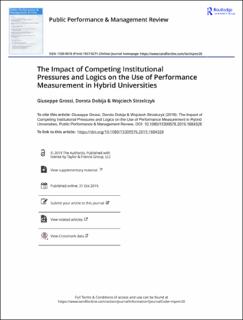The impact of institutional pressures and logics on the use of performance measurement practices in hybrid universities
Peer reviewed, Journal article
Published version

Åpne
Permanent lenke
https://hdl.handle.net/11250/2658128Utgivelsesdato
2019Metadata
Vis full innførselSamlinger
Originalversjon
Grossi, G., Dobija, D. & Strzelczyk, W. (2019). The impact of institutional pressures and logics on the use of performance measurement practices in hybrid universities. Public Performance & Management Review. doi: 10.1080/15309576.2019.1684328Sammendrag
This study contributes to the current debate on competing institutional pressures and logics and performance measurement practices in hybrid universities and examines how shifts in logics have affected performance measurement practices at the organizational and individual levels. It draws upon the theoretical lenses of institutional theory and adopts a longitudinal case study methodology based on participant observations and retrospective interviews. The findings show that universities and academic workers are affected by external pressures related to higher education that include government regulations and control of the state (state pressure), the expectations of the professional norms and collegiality of the academic community (academic pressures), and the need to comply with international standards and market mechanisms (market pressures). Academic workers operate in an organizational context in which conflicting conditions from both academic and business logics co-exist. The results indicate that institutional pressures and logics related to the higher education field and organizational context shape the use of universities’ performance measurement practices and result in diverse solutions. While previous literature has focused mainly on competing logics and the tensions they may generate, this study shows that, in a university context, potentially conflicting logics may co-exist and create robust combinations.
